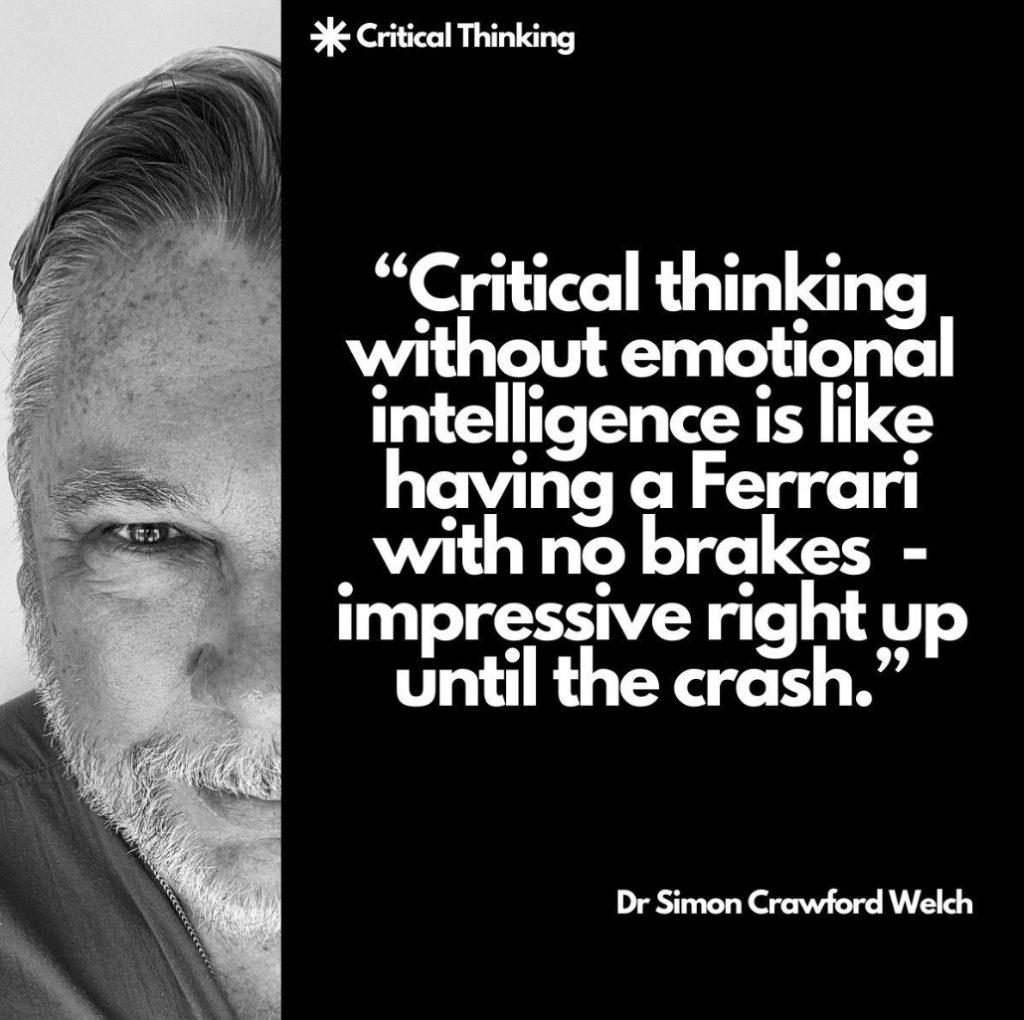The 3 Intelligences Behind True Critical Thinking
By
Simon Crawford Welch, PhD
“Think Smarter, Feel Deeper, Lead Wiser”

We love to glorify critical thinking. It’s that golden phrase that shows up on résumés, in leadership workshops, and motivational posters. But what does it actually mean? Is it just about being smart? Or is it about being emotionally perceptive, grounded, and wise? The truth is, critical thinking isn’t just about IQ – it’s a three-dimensional skill that blends logic, empathy, and purpose. In other words, it’s the marriage of IQ (intellectual intelligence), EI (emotional intelligence), and SQ (spiritual intelligence). When those three work in harmony, you don’t just make better decisions – you make wiser ones.
The Foundation: IQ – The Logic Engine
Let’s start with the brainy part – IQ. It’s your cognitive horsepower, the part that handles logic, reasoning, and problem-solving. IQ helps you dissect complex issues, spot inconsistencies, and build frameworks for sound decisions. It’s what allows a scientist to test a hypothesis, an engineer to design a bridge, or a strategist to spot patterns in data. IQ is the engine that powers your ability to analyze and solve problems efficiently.
But here’s the kicker: IQ alone can make you brilliant yet unbearable. We’ve all met someone who’s technically right but emotionally tone-deaf – the kind of person who can win arguments and lose friends in the same breath. High IQ without emotional awareness is like a Ferrari with no steering wheel. You’ll go fast, but probably into a wall.
The Heart of It All: Emotional Intelligence (EI)
If IQ is the engine, EI is the steering wheel – it keeps you from running over people while charging toward your goals. Emotional intelligence is the ability to recognize, understand, and manage emotions – both your own and others’. It’s what transforms intelligence into influence.
A leader with high EI doesn’t just react; they respond. They understand their triggers and pause before making rash decisions. They listen actively, empathize sincerely, and communicate clearly. This isn’t fluffy “feel-good” stuff – it’s practical leadership gold. In a high-pressure environment, EI is what keeps you from snapping at your team, misreading a situation, or making emotionally fueled choices you’ll regret later.
The best critical thinkers know that emotions aren’t obstacles to logic – they’re data. Emotions reveal what matters most to people, and great thinkers use that information wisely. When IQ and EI work together, decisions become not just logical but human. You might analyze a market trend (IQ), but you’ll also consider how your decision affects morale, trust, and culture (EI). That blend is what turns competence into leadership.
The Missing Link: Spiritual Intelligence (SQ)
Now, let’s talk about the third – and often neglected – dimension of intelligence: spiritual intelligence. Don’t let the word “spiritual” throw you off. SQ isn’t about religion; it’s about meaning, purpose, and values. It’s the compass that ensures your decisions are not just smart or empathetic, but right.
SQ is what helps you connect actions to ethics. It’s asking, “Is this decision aligned with my values?” or “Will this choice create long-term good, or just short-term gain?” It’s what keeps a leader from cutting corners for profit or ignoring the human cost of efficiency. It’s the intelligence that fuels integrity.
For example, a CEO guided by SQ doesn’t only look at quarterly earnings – they also think about sustainability, social impact, and legacy. A diplomat guided by SQ doesn’t just seek peace on paper but aims for lasting understanding between cultures. SQ also fuels resilience – that deep, internal calm that keeps you grounded when the world feels chaotic. It helps you step back, reflect, and see the bigger picture when everyone else is lost in the noise.
When All Three Work Together
IQ, EI, and SQ are like three gears in a single, powerful machine. When one spins alone, it grinds and burns out. Together, they move smoothly and create momentum.
Rely only on IQ, and you might be smart but disconnected. Lead only with EI, and you might be kind but indecisive. Operate solely from SQ, and you risk becoming idealistic without execution. But integrate all three, and you get a rare kind of clarity – the ability to see things logically, feel them deeply, and judge them ethically.
A truly critical thinker doesn’t just solve problems; they solve the right problems. They analyze (IQ), empathize (EI), and align their choices with values (SQ). That’s the trifecta of modern intelligence – thinking with your head, heart, and conscience.
Building Your Critical Thinking Muscles
You don’t have to be born with these skills. You can build them, just like any other muscle – with intention and practice.
To strengthen your IQ, keep your curiosity alive. Read beyond your comfort zone. Challenge your assumptions. Engage in problem-solving activities like puzzles, debates, or brain games. The goal isn’t just to learn more – it’s to think better.
To expand your EI, start with self-awareness. Notice your emotional triggers. Learn to pause before reacting. Practice active listening – not the kind where you’re just waiting to speak, but the kind where you genuinely try to understand. Reflect on your communication patterns. Are you responding thoughtfully or defensively? The difference defines your emotional maturity.
And to deepen your SQ, spend time in reflection. Ask yourself: “What really matters here?” or “Does this align with who I want to be?” Take walks without your phone. Journal. Meditate. Think about the ripple effects of your decisions. SQ isn’t about perfection – it’s about alignment. It keeps your success from outpacing your soul.
Why This Matters More Than Ever
We live in a world drowning in data and starving for wisdom. Everyone has opinions; few have perspective. We scroll, react, and judge in seconds – often without thinking at all.
That’s why critical thinking, in its truest sense, is more essential than ever. It’s the antidote to noise, bias, and emotional overdrive. It helps us filter truth from misinformation, reason from reaction, purpose from distraction.
But here’s the paradox: the more information we have access to, the less we seem to think. True critical thinkers aren’t the loudest in the room – they’re the calmest. They pause, reflect, and ask better questions. They combine intellect, empathy, and purpose to make decisions that are not only smart but meaningful.
The Takeaway: The Whole Brain Approach
Critical thinking isn’t about showing how intelligent you are – it’s about using your intelligence wisely. When IQ gives you logic, EI gives you connection, and SQ gives you conscience, you move through the world with clarity, courage, and compassion.
In a world obsessed with being right, critical thinkers strive to be wise. They don’t just chase answers; they seek understanding. They don’t just lead with logic; they lead with humanity.
So yes – think smart. But also, feel deeply and live purposefully. Because when the head, heart, and spirit work together, you don’t just make better decisions – you become the kind of person others trust to make them.
Simon Crawford-Welch, PhD, is the Founder, The Critical Thought Lab. Author of “American Chasms: Essays on the Divided States of America” & “The Wisdom of Pooh: Timeless Insights for Success & Happiness” (Available on Amazon) www.linkedin.com/in/simoncrawfordwelch



